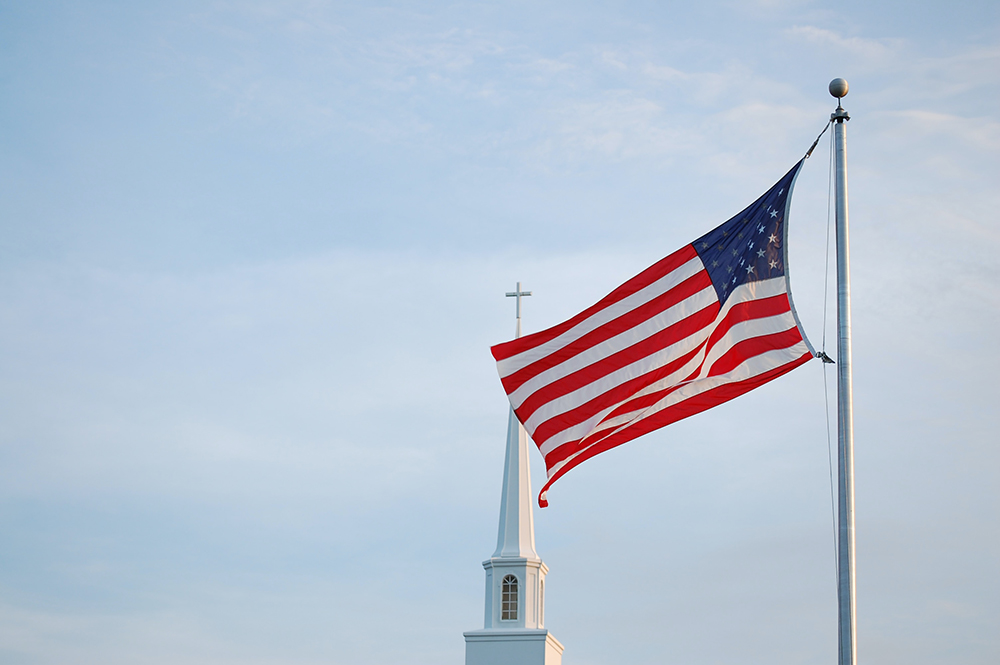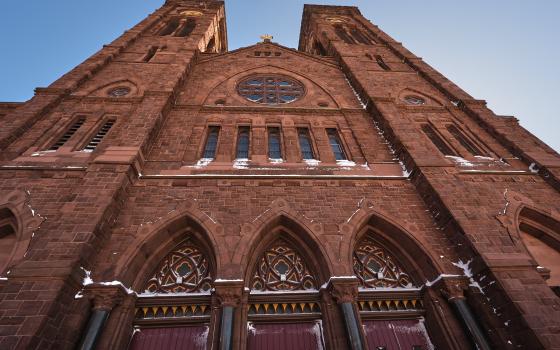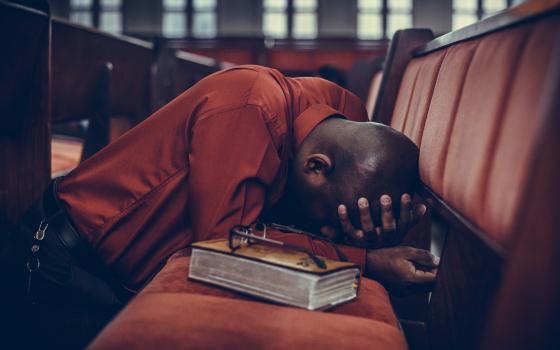
(Unsplash/Brad Dodson)
That is the answer I would give to the above question. It was posed by the facilitator of a focus group to eight Republicans. Each of them answered the question about whether a Christian or a person of deep faith could be politically progressive, and they each answered "No." This segment on the PBS NewsHour featuring the work that Judy Woodruff is doing on the situation in our country disturbed me greatly.
The reason it was disturbing is that I have just completed a project with Network, a national Catholic social justice lobby, where I served as executive director from 1982-1992. Mary Novak, the first layperson to be the executive director, invited me to design a contemplative listening process to assist congregations of women religious in reflecting on their legacy of social justice and imagining how it can continue to evolve as religious life undergoes transformation. Funded by the Conrad N. Hilton Foundation, Mary and I had the privilege of engaging 10 congregations in this process. (Editor's note: The Conrad N. Hilton Foundation is a major funder of Global Sisters Report.)
The responses by everyone stirred a renewed passion in my heart for what women religious have done as they lived into the mandate from the 1971 Synod of Bishops, which stated that "Action on behalf of justice is a constitutive dimension of preaching the Gospel." Those words were transformative for women religious. Together with the documents of the Second Vatican Council, women religious in the U.S. began to see their ministries through a new lens. Over these past 60 years, the work of social justice and systemic change has been central to the embodiment of the charism of religious life.
Advertisement
Those words took flesh as congregations reflected on their congregational legacy as well as the legacy of women religious throughout the United States. Listen to what they had to say about the source of their actions:
- Our action comes from the depth of our connection to the holy.
- It is deeply mystical and contemplative, stemming from the breadth and depth of our life in God.
- Prayer, relationship to the holy, as well as community, grounded us and opened us to find God in surprising places.
- It transformed us and helped to create church for so many and kept so many in the church.
- We took the Gospel seriously and embraced the commitment to human dignity.
- We kept our eyes and ears open to those who were not being served elsewhere, those who were being excluded, and those who were on the margins or the periphery, as Pope Francis likes to say.
- Our response was in relationship with others who were suffering and in need of healing and whose suffering broke open our hearts.
- Our response was in conversation with experience, recognizing the resilience of those with whom we had the privilege to walk.
This deep faith and commitment to the Gospel found expression in actions as they:
- Read the signs of the times and saw the evolving spectrum of charity to justice to systemic change to transformation of consciousness.
- Recognized the importance of political ministry to change federal policies and ensure the common good by providing the basic human needs necessary to safeguard the dignity of every creature.
- Used their finances for socially responsible and impact investing, thereby challenging corporations to prioritize the health of Earth and its people over profits.
- Went to the margins, to the periphery, where those who suffer from structural injustice live, in order to speak truth in love rooted in experience.
- Used their voice in the public arena and took corporate stances.
- Understood the centrality of Earth and integrated sustainability and care of the Earth into their understanding of systemic change.
- Grew into the realization that we are all connected — sentient and non-sentient beings — and viewed issues and each other through this lens.
- Understood and named how we and they are and have been complicit in injustices perpetrated by white privilege, holding a both/and position as they sought forgiveness and offered reparations.
Understanding the Gospel in this way expands the work of justice in the public forum biased toward certain things:
- Biased toward those who are economically disadvantaged and lacking the basic needs of food, shelter, health care and education.
- Biased toward those whose human dignity and equality are ignored.
- Biased toward a more equitable distribution of wealth, goods and services within an economic system that values individual profit over the common good.
- Biased toward an international community in which peace and justice prevail and people are welcomed across borders.
- Biased toward the welfare and future of the planet, ensuring clean air, water and other natural resources, therefore needing to address climate change.
To take seriously the Gospel mandate "to love one another as oneself," challenges all Christians to expand the focus of their political positions. Too often, a singular focus on issues of sexuality defines a Christian's political stance. Pope Francis challenges all people of good faith, deeply religious, Christian or Catholic, to be multi-issue advocates, supporting political positions that foster the common good and address the needs of the many over the wants of the few.
It is only recently that the word "progressive" has become central in today's war of words.
Legislation that embodies those positions is considered progressive and was supported by both political parties in the past. It is only recently that the word "progressive" has become central in today's war of words. The extreme right paints those with whom they disagree with the broad brush stroke of "progressive," describing it with words like communist, liberal, socialist, fascist, etc., which generates fear for too many. Perhaps that is what the focus group thought when asked the question, "Can a Christian be progressive?"
The vast majority of women religious throughout these last six decades have shown that embodying the mandate of love within the public arena means supporting policies that embrace the needs of the poorest throughout the world as well as protecting our Earth home. It involves supporting issues and public policies that are often categorized as a progressive agenda. We cannot allow the work of love to be sabotaged by an extreme minority that dismisses these efforts as un-Christian.
I believe the time we are in challenges both women religious and others who have followed a similar path to be prepared to engage in conversation about why we believe what we believe and support what we support. Being a deeply spiritual person, Christian or Catholic, can invite a bias toward those at the margins and those suffering from decisions made too often by those in power to maintain their power.
And to do so from a stance of love is key. Today's political climate challenges us to move away from an either-or position and embrace a both-and posture. In our democracy, we need to take positions on specific legislation and elect those who support it. And rooted in our love for one another, we need to open ourselves to listen to each other, engage in conversation about our differences, and be open to other possibilities so that we begin to heal and lessen the divisions among us.
For me, that is what contemplation invites us to do. It continues to deepen our contemplative gaze, encouraging us to take a long, loving look at the real. It prompts us to interpret the times not only through analysis but through the eye of the heart. Contemplation creates the spaciousness needed to awaken to God, divine mystery within us, so that we can respond out of a new consciousness, Christ consciousness. We must continue to evolve the ongoing mandate of action on behalf of justice as a constitutive dimension of the preaching of the Gospel into the future.
Editor's note: Sr. Nancy Sylvester invites anyone who would like to share their response to the question, "Can you be a person of deep faith, or Christian or Catholic and progressive?" to do so and send it to [email protected]. "Perhaps a compilation of these responses could provide helpful hints for us in terms of future conversations," Sylvester says.






